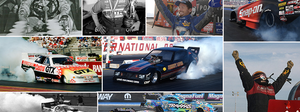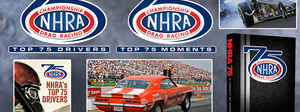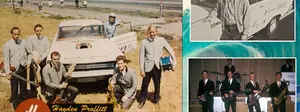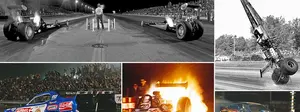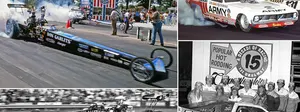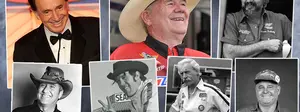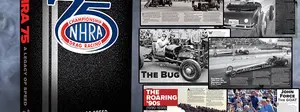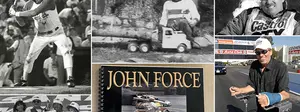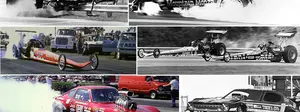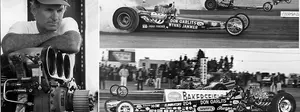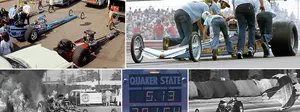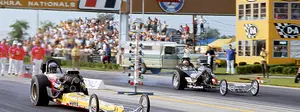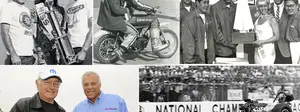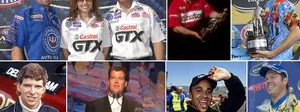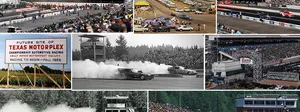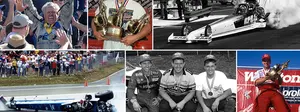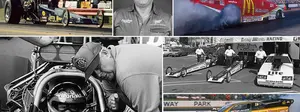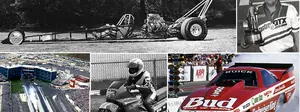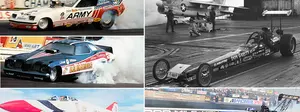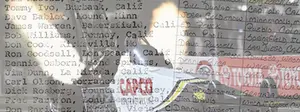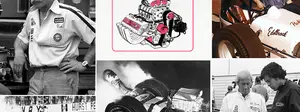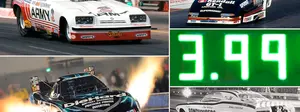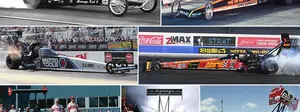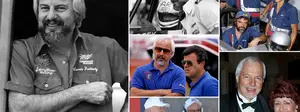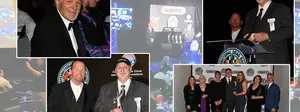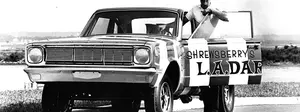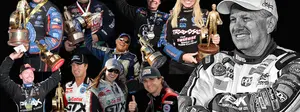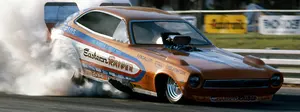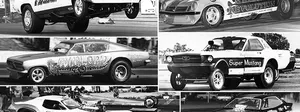Teen Terrors of the '70s: Jeb Allen
 |
This is the first in a series of articles on teenage nitro drivers of the early 1970s, beginning with Jeb Allen, the only teen driver to win in a nitro class at an NHRA national event. He was the sport's youngest Professional-class winner when he won the 1972 Summernationals Top Fuel title at the tender age of 18 years, 1 month, and to this day remains not only the youngest Top Fuel winner, but also the youngest Professional-class winner in history. In 1981, at 27 years, 4 months, he became NHRA’s youngest Top Fuel world champ, another record that he still holds.
His was a meteoric career that spanned just a decade. He finished eighth in 1982, failing to qualify at that year's World Finals, and pretty much dropped off the radar screen. He left the sport and, detoured by alcohol and drugs, lost his way for the better part of the remainder of the decade. He became NHRA's greatest "What ever happened to?" question.
His last year on the tour, 1982, was my first on staff here, and I never really got a chance to know him. When he called me out of the blue in 2010, looking for some photos, it was great to hear from him and of the success he has become after a rather black period in his life in the 1980s. He was open and candid about his trials in life, which resonated very deeply with me as I had a family member struggling with addiction at the time. I wrote a column about him (Jeb Allen: Building a new life, one home at a time) to share that experience, then wrote an in-depth story on him that ran in National Dragster. In the spirit of full disclosure, large portions of this column are lifted from that ND article and supplemented with additional new information from interviews with Jeb in the years since.
 |
o hear Jeb tell it, it was his mother, Betty, who got the family turned on to drag racing. She and her husband, Guy, had been together since they were teenagers and had three sons: Ed, Les, and Jeb.

Jeb Allen with his mom and dad, Bakersfield 1966 (Steve Reyes photo)
|
"My mom dragged me and my dad to the races," he remembers. "This was in the early 1960s. We both got hooked the first time we went out. He had that same obsessive personality that I have, and we both fell head over heels in love with it. From the time I was 8 years old, that's all I knew, every weekend."
An injected gas dragster named Night Train was followed by a pair of injected fuel dragsters for Ed and Les. Les drove the car called the Stinger, and Ed wheeled the Wasp, beginning the tradition of naming their cars after insects that led to their famed Praying Mantis Top Fuelers.
The Stinger was a great success, winning a reported 85 of 88 rounds in 1965, and in 1966, Ed won Jr. Fuel at the famed Bakersfield March Meet while Les set the national record at 199.10 mph.
The first Praying Mantis, fielded in 1969, was a front-engine Woody Gilmore Top Fueler driven by Les, though according to Jeb, Les only drove it about a half-dozen times before vacating the seat, which for a short time was filled by Hank Westmoreland in 1970.
Jeb, meanwhile, at the tender age of 16, had gone on tour with Steve Carbone during the summer of 1971 and had the racing bug bad.
 |
"I realized that standing on the starting line wasn't enough, that for all this work and effort, I'd much rather be driving,” he remembered. “Looking at those front-engine dragsters, I never wanted to drive one. My family was actually going to quit racing. Eddie didn’t want to drive it, and Leslie was having some personal issues. But when I saw Garlits’ [rear-engine] car, I called my dad and told him I’d drive one of those. He told me to come home and get my license in their front-engine car. My dad got all excited that I wanted to race.
“I only drove the front-engine car for about 15 runs,” he remembers. “Getting licensed was the tough part. It would shake real bad. I would drive it 300 feet and shut it off. I made six or seven runs, and finally [starter] Larry Sutton came up and told me, ‘Look, we’re getting tired of this [stuff]. Reach down and grab [a portion of the male anatomy] and hang on because once you get through it, it will be fine.’ I did, and he was right, and it was fun after that.”
Allen licensed with competitive numbers, becoming the youngest licensed Top Fuel driver in NHRA history at 17 years and change. As promised, a new rear-engine car was built, and Allen went to the semifinals of his debut event, the 1971 Supernationals at Ontario Motor Speedway. The Allens hit the road in 1972; all the while, Jeb remained a student at Bellflower High School.
"The school was very supportive," he remembers. "They saw the magnitude of what I was trying to do and said they would work with me so I could graduate. I’d go to school for maybe an hour and a half each day."
It didn't take long for them to strike gold. Allen won the Summernationals that year, a race he would win two more times and be a runner-up at three other times. His initial victory was capped by a final-round win over the legendary "Mongoose," Tom McEwen.
"That was really something," he says, still a little in awe. "When I was a little kid, our shop was right around the corner from where they kept the Yeakel Plymouth dragster that McEwen was driving, and I’d go hang out with Lou Baney and his son and polish McEwen's car."

Allen won his first Top Fuel title -- and his first of three Summernationals scores -- in 1972, defeating Tom McEwen in the final.
|
He followed his E-town win with a runner-up in Montreal, and the attention that the teenage phenom got quickly attracted sponsors like Revell and English Leather, allowing Allen to get new and better equipment. As his career blossomed, with his parents' blessing, he took over control of the operation.
He scored a memorable runner-up to Carl Olson at 1972's Last Drag Race at Lions despite never winning a round – he was reinserted multiple times under the old "break rule" -- and his second-place finish meant that he was the last driver to ever cross the Lions finish line. All was right in his world.

Allen and John Wiebe tangled at the 1973 Tulsa, Okla., event. (Don Gillespie photos)
|
 |
Then came Tulsa, Okla., 1973.
Paired in the first round of the PRO event with good friend John Wiebe, they became involved in one of the most terrifying two-car accidents in the sport's history. Disoriented by severe tire shake, Wiebe plowed into the side of Allen's dragster, sending both cars tumbling and disintegrating down the track.
"All I remember was that everything turned around, and I was inside a fire for quite a long time," he said. "The safety equipment then wasn't what it is today, and the fire started coming inside my visor, so I put my hands over my face and held on, and I got third-degree burns on my hands."
In a way, Allen's life also began tumbling and disintegrating. "John and I were best friends at the time. We'd share motel rooms and everything. After that happened, we kind of went our own ways. Rebuilding was a big financial burden, and I had to back things down quite a bit, and I also got a little lost trying to sort out my life," he says.
Even though his teen years ended, the winning did not. Although it took Allen three more years to get back to the winner’s circle, he did so with earnest. After a runner-up at the Summernationals in 1976, Allen won in Seattle and was runner-up to Shirley Muldowney at the 1977 Summernationals. Allen also won the 1977 AHRA season championship and match raced extensively against AHRA kingpin Don Garlits.
"We raced Garlits every opportunity we got. Mondays, Wednesdays, Saturdays … I did a lot of match racing, more so than national events," he said. "When I did run the NHRA nationals, I never pushed it too hard; I was just trying to survive. I was hard-pressed to have a complete spare motor or short block. It was a struggle the whole time. We ran on a real shoestring budget. Every year on my birthday, my dad would buy me a supercharger; maybe that's why I always did well in Englishtown. I couldn't afford a lot of parts."
Allen won the Summernationals back to back in 1978 and 1979, but those were his only NHRA successes that decade. The 1980s would be much better to him.
Allen won the Gatornationals in 1980 and was runner-up three times – at the Cajun Nationals, Summernationals (again!), and Indy, to Terry Capp -- and entered the season finale in Ontario, Calif., as one of four drivers with a championship shot, with Muldowney, Gary Beck, and Marvin Graham, but Allen was a surprising DNQ, and Muldowney claimed her second championship. There was some consolation for Allen: He had won the IHRA crown that year and had hired journeyman crew chief Lance Larsen to help tune the car.

(Above) It took more than five years for someone to better Don Garlits' amazing 5.63, recorded at the 1975 World Finals, and it was Allen who did it with a 5.62 at the 1981 Gatornationals. Allen went on to win the championship that year in dramatic fashion. (Below) Allen flew the big No. 1 on his car the following year, but dark clouds were building on the horizon of his life.
|
 |
They kicked off 1981 with a huge victory at the Winternationals but made even more news during qualifying at the Gatornationals, where Allen zoomed to a 5.62, the first run to eclipse Garlits' six-year-old 5.63 pass from the 1975 World Finals. His 250.69 speed also made him the seventh member of the NHRA 250 MPH Club for Top Fuelers.
Allen went on a tear, winning the Cajun Nationals and Mile-High Nationals, then added a late-season victory at the inaugural Golden Gate Nationals in Fremont, Calif., before heading for a showdown at the World Finals with Beck.
All Allen needed to do to secure the championship was to win the first round, but a broken blower belt sidelined him, forcing him to watch Beck's pursuit. Beck had a tall order: He had to win the race and set low e.t. and top speed to pass Allen.
Beck reached the final round and faced Dwight Salisbury – ironically, the guy to whom Allen had lost. Beck needed to win the round and run quicker than 5.641 and faster than 247.93. Allen was standing in the shutdown area, probably ready to cry either way.
Everyone saw Beck's blue digger turn on the win light, but there were no scoreboards, so it was up to announcer Dave McClelland to let the world in on the details.
"He's got the time!" shouted McClelland. Beck had run the quickest pass in history, a first-in-the .50s 5.57.
As reported in ND that week, Allen was seen throwing his hands to the sky and screaming, "What's the top speed?"
"For the want of two miles per hour," McClelland intoned, "Gary Beck has missed the world championship." Beck's 245.23 wasn't fast enough, and Allen was the new champion, completing a rare trifecta of series championships.
Despite the championship, Allen's life was turning upside down. All the years of traveling and having to nickel-and-dime his way to the winner's circle had taken their toll, and he quit the sport after the 1982 season.

Allen, looking fit and happy -- he mountain bikes all over the world these days -- took part in a panel discussion earlier this year at the Irwindale Reunion.
|
"I was getting tired," he admitted. "There were some issues I had festering, and I couldn’t get the sponsorships I needed. English Leather said they could sponsor me again, but they couldn't give me quite as much money. I was drinking quite a bit. I never drove under the influence, but at the end of the day, I just couldn’t wait to have a beer, and I just drank too much and used drugs. Finally, I decided I needed a vacation, and all I did was 'vacation.' "
He got sober in 1988, learned how to build houses while working construction, and founded Palomar Builders – naming it after the piping company that his late father, Guy, used to run – and moved to Redding, Calif., with his wife, Sue. Today, they are the biggest home builder and largest residential land owners in the city.
"I took getting sober just as important as any drag race. For a year, I went to three meetings a day, and all I did was concentrate on doing what I was told and not drinking. Once you get your priorities straightened out, good things seem to happen. Everything I ever looked for and wanted out of booze and drugs, I get that feeling every day by being sober. It doesn’t cost me anything, and I wake up feeling good. Getting sober is my biggest accomplishment in life."
And for a guy who accomplished as much as Allen did in our sport, that’s really saying something.
Next week: Bobby Hilton



